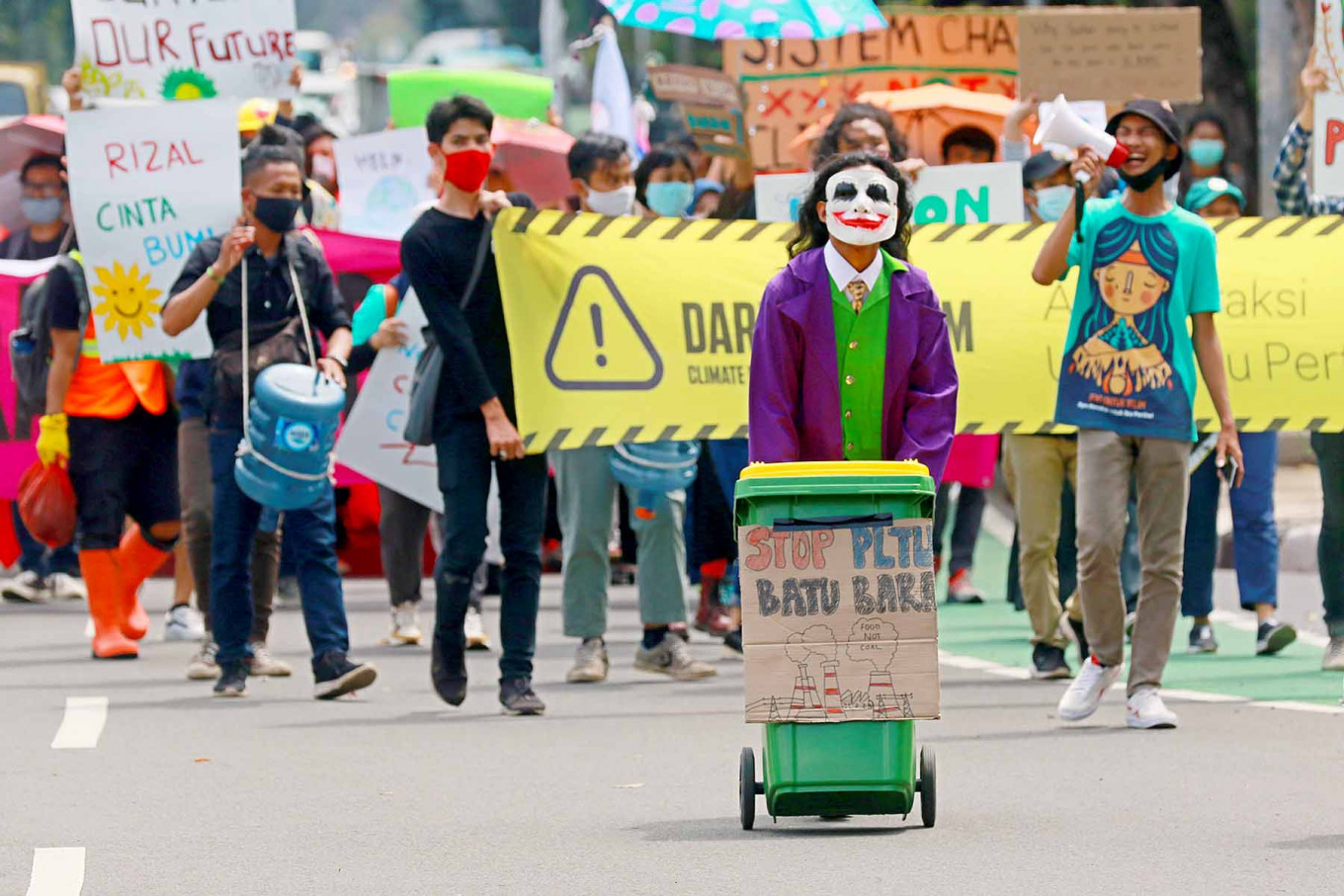Popular Reads
Top Results
Can't find what you're looking for?
View all search resultsPopular Reads
Top Results
Can't find what you're looking for?
View all search resultsHow crowdfunding could raise $12 billion to boost renewable energy access in Indonesia
Our findings indicate that more than 7 percent of Gen X, millennials and Gen Z (equivalent to 14 million of Indonesians) are enthusiastic about investing in green projects.
Change text size
Gift Premium Articles
to Anyone
I
ndonesia has a target to have 23% of its energy mix coming from renewable sources by 2025, and the country needs at least Rp 1,600 trillion (US$102.4 billion) to make that happen.
This is not an easy task, especially for medium and small-scale projects. Renewable energy projects require huge investments and this high cost makes small projects unattractive and therefore not bankable. As a result, they have to rely on grants and government budgets.
To meet its energy mix target, Indonesia has to look elsewhere for funding.
Our research shows that public crowdfunding could be a potential alternative to finance clean energy development. Our findings indicate that more than 7% of Gen X, millennials and Gen Z (equivalent to 14 million of Indonesians) are enthusiastic about investing in green projects. Using Slovin’s formula as the sampling technique, we investigated this possibility by surveying 403 respondents coming from the upper-middle-income bracket, mainly from Java and Bali.
Our study found that raising funds from the public could raise up to Rp 192 trillion (US$12.29 billion) in green financing annually. If optimised, mass funding can be one of the country’s key drivers of sustainable development.
Crowdfunding to build Indonesia’s renewable power mix
We aimed to gain perspectives from the early adopters of green projects and gauge their willingness to invest for such projects through this study. We found our respondents were indeed keen to invest or donate, and this has the potential to finance medium and small-scale green projects without relying on large donors and government budgets.
Our results showed that on average, respondents were willing to invest and donate around Rp 10.53 million (US$674) and Rp 2.89 million (US$185) per person each year, respectively. This means that crowdfunding can raise up to Rp 192 trillion of investment and Rp 45 trillion (US$2.88 billion) of donations annually.
These potential investors expect a 5-8% return on investment in less than 24 months. Meanwhile, we can boost donation values by offering rewards, such as souvenirs.
The figure could finance around 5,949 off-grid solar power plants of 1 Megawatt (MW) out of Indonesia’s total 200,000 MW solar plant potential.
This amount could also fund 830 micro hydro power plants with a power of 10 MW out of a total potential of 75,000 MW per year.
In addition, we found the general public was willing to invest and donate to green projects such as forest restoration, clean water supply and environmentally friendly vehicles.
Meanwhile, more than 40% of respondents chose to invest and donate to Indonesia’s outermost and disadvantaged areas, despite 85% of the respondents living in Java, Madura, and Bali, due to lack of access to power in those disadvantaged regions. This finding means that crowdfunding has great potential to boost renewable energy development in the frontier, outermost, and least developed regions of Indonesia.
What’s holding back this funding?
The potential is huge, but crowdfunding for clean energy projects has yet to become a priority. Almost all respondents said they preferred education and health projects as their primary focus for investment and donation.
Moreover, despite the promising potential, investors still preferred to invest in high-yield instruments, such as equity mutual funds, rather than investments with environmental and social benefits that offer low yields.
Socioeconomic factors also play an essential role in determining willingness to invest and donate. These factors include gender, education, age, and income.
Regarding gender, men tend to invest and donate more in quantity and frequency. Meanwhile, people with an associate’s degree and above were much more willing to invest than those with a lower level of education.
Age positively correlates with the intention to invest in green projects. However, those aged 44 were more interested in donating than investing. Lastly, there is no clear relationship between income level and the willingness to invest and donate.
Lack of literacy and access to finance are inhibiting factors
Our research showed that although 60% of respondents were aware of environmental issues, donors and investors were yet to prioritise clean energy projects. This is due to the lack of knowledge about the impact of environment problems on people’s welfare.
Low financial literacy in Indonesia is also behind the lack of investment interest. Indonesia’s financial literacy index was only 38.03% in 2019, lower than other ASEAN countries, such as Malaysia and Singapore with their indexes reaching more than 85%.
Furthermore, only a few crowdfunding platforms currently focus on green projects, including clean energy. This was likely due to the lack of liaison between the actors in the energy sector and the crowdfunding platforms.
Strategies to optimise crowdfunding potential
Indonesia can learn from other countries in Europe. They include the UK, the Netherlands,and Germany, which have well-established crowdfunding system to fund small to medium-scale renewable energy projects.
Enhancing financial literacy, providing incentives for platforms and projects, as well as increasing awareness around environmental and social issues can maximise the potential of crowdfunding.
State institutions may apply supporting policies and strict supervision. Indonesia’s Financial Services Authority may set rules related to investment-based crowdfunding, while the Ministry of Social Affairs covers the donation-based ones.
Our survey found that alternative community-based green project funding has enormous potential in Indonesia. This funding provides may increase public awareness of environmental and social issues around us. However, the government, business leaders and crowdfunding platforms are yet to consider this option.
![]() ---
---
This article is republished from The Conversation under a Creative Commons license. Read the original article.











